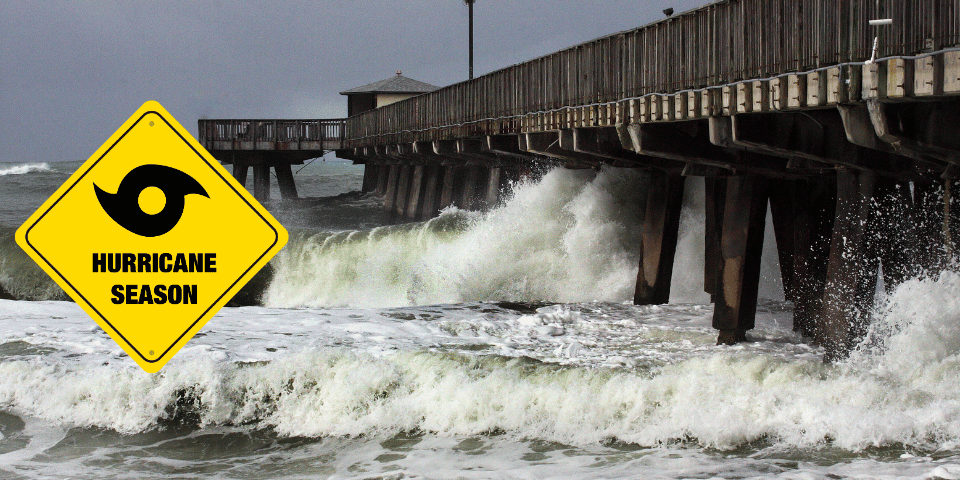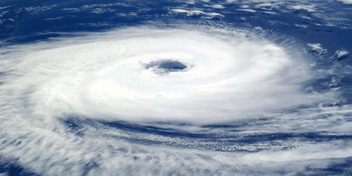Important Preparations for Hurricane Season
May 31, 2024

Like it or not, another hurricane season is here. Here's your chance to get ahead of the curve by making the necessary preparations now.
June 1st means different things to different people, but if you live along or near the Texas, Florida or Carolina coasts, then June 1st probably means something very different to you - the official start of the hurricane season.
In a recent Washington Post article, the National Oceanic and Atmospheric Administration (NOAA) predicted that this season could be the worst in decades. It doesn't matter where you fall on global warming or climate change - the most important thing to know is that the best way to lessen the impact of a catastrophic event is to prepare well in advance. Here, we've outlined some of the most valuable preparations to lower your stress in the event of an actual evacuation.
Plan your Evacuation Route in Advance
In case of a mandatory evacuation, it’s important to plan where you will evacuate, how you will get there, and where you will stay. Nothing is more frustrating than coming up with these details when you have the stress of a hurricane approaching. Make a point of having this discussion with your family and ensuring everyone understands the plan.
When it comes to planning your hurricane evacuation route, foresight is key to ensuring a safe and smooth evacuation process. Designating multiple evacuation routes is advisable to account for potential road closures or congestion during emergencies. Coordinating with your family members and revisiting the evacuation plan regularly can help everyone feel prepared and reassured in the event of a hurricane.
- Consider the accessibility and condition of your chosen evacuation route. Familiarize yourself with alternate routes and keep abreast of any potential construction or closures that could affect your path to safety. Having a well-thought-out plan not only reduces stress during urgent situations but also enhances the efficiency and safety of your evacuation efforts.
- When evacuating with multiple family members and vehicles, it is a common decision to evacuate in a caravan fashion. Decide in advance how you will manage it if family members or vehicles become separated from one another during an evacuation. Ensuring that all evacuees have the address of your evacuation destination or a designated meeting point in case family members get separated will remove a common source of anxiety.
- Ensure automobiles are fueled up and that tire condition and pressure has been checked. It is also wise to equip each vehicle with an emergency roadside kit that contains items like jumper cables, batter- powered flashers and a printed copy of the current auto insurance card.
- Identify Shelters along the way, in the event you are delayed or unable to reach the destination of your evacuation plan. If evacuating with pets, make sure you research which emergency shelters will accept pets and under what conditions.
Keeping abreast of local emergency information and heeding evacuation orders promptly are crucial steps to safeguarding yourself and your loved ones. Collaborating with neighbors and community members to establish a support network can also provide additional resources and assistance during challenging times.
Discuss Responsibilities and Assign Tasks
In multigenerational and blended families, discussing responsibilities and assigning tasks to ensure everyone's safety during a hurricane is essential. Consider the needs of elderly family members and single parents within your extended family. Plan and allocate roles for specific tasks, such as designating who will be responsible for picking up Grandma in the event of an evacuation. Explore the option of evacuating together with other extended family members to consolidate resources and support each other during uncertain times. By having these conversations and sharing responsibilities you can strengthen your family unit and enhance preparedness for emergencies like hurricanes.
Here is an example of a Pre-Hurricane Lask list:
- Procure bottled water and non-perishable food
- Secure the home. This includes anchoring lawn furniture, grills, planters and other items that may become airborne in strong winds, and if necessary, secure windows and doors with plywood.
- Gather necessary important documents like home and health insurance documents
- Lock valuables and non-essential documentation like birth certificates and passports in a safe deposit box
- Make a list of all medications and refill prescriptions for everyone in your family
- Assemble pet supplies, if necessary
- Prepare automobiles for evacuation by fueling up, checking tire pressure, or moving to higher ground if there is a chance of flooding.
Remember, proactive planning and open communication are fundamental in ensuring a secure and well-coordinated evacuation plan. Ensure that a list of emergency contacts has been established and everyone in your family has their telephone numbers and email addresses.
Stock Up on Supplies Early
If an evacuation order is not recommended or mandated, you may decide to stay put and ride it out. There is no absolute right or wrong decision in this scenario; rather, you should assess your family's individual needs. If you have infants, elderly, or people with special needs in your family, an evacuation is usually the safest thing. If you do decide to stay, you will need to stock up on some necessities and prepare for the possibility of being without electricity, gas or access to clean water for several days at a minimum. Some of these essential supplies include the following:
- Water: At least one gallon per person per-day for at least three days.
- Food: At least a three-day supply of non-perishable food.
- Medications: A week’s supply of prescription medications, plus over-the-counter medicines.
- First Aid Kit: Bandages, antiseptics, and other first aid supplies.
- Flashlights and Batteries: Extra batteries for radios, flashlights, and other necessary devices.
- Tools: Multi-purpose tools, duct tape, plastic sheeting, and garbage bags.
- Sanitation Supplies: Personal hygiene items, moist towelettes and disinfectant.
- Important Documents: Copies of insurance policies, identification, and bank account records in a waterproof container.
- Battery-Powered Radio: Keep a NOAA Weather Radio to stay informed about the storm.
Conduct a Personal Property Inventory
Creating a thorough home inventory is essential when preparing for a hurricane, and is something that should be done annually, regardless of whether you live in an area affected by hurricanes. If you need to file a claim with your homeowners or renters’ insurance, a home and personal property inventory will allow you to easily recall a list of your property. This annual exercise also helps you determine if you have enough insurance coverage to cover the potential loss of your possessions and allows you to purchase more if needed. In
In addition to a written or digital inventory, you should also document the condition of your property and possessions with photos and video.
Plan Care for Pet and Service Animals
If you have pets, it’s important to plan for their needs in case you must evacuate or cannot replenish food or other supplies. Here are a few items to ensure your furry best friend is also taken care of.
- Food supplies/treats: Prepare containers of food or treats so that you can ensure that your pet has food on the road in case stores are closed or don’t have your dog’s food in stock.
- Crate or pet carrier: If your pet is crate/kennel trained, be sure to bring it to your destination. This will allow you to have a safe place for your pet if the hotel or shelter does not allow animals.
- Microchip/Identification: If your pet has not been microchipped by your vet, you may want to consider it in case of an emergency. If your pet has a collar with a tag, be sure to put it on your pet before evacuating. If your pet gets lost on the road or in a different town, a microchip increases the chance that you will be reunited with them.
- Familiar items: Does your pet have a favorite blanket or toy? Whatever comforts your pet, be sure to bring it along in an evacuation.
- Water: Water is very important! If you are buying water for yourself, you need to buy that much more water for your pet in case of an emergency.
For a more in-depth look at disaster preparation for pets, consult this Red Cross Guide.
Remember, the key to weathering a hurricane or other natural disaster is preparation. It is essential to have a well-thought-out emergency plan in place. This plan should include details on evacuation routes, emergency contacts, and a fully stocked emergency supply kit to sustain you and your family in case of extended disruption. Ensure that you stay informed of updates from reliable sources such as the National Weather Service and the National Hurricane Center and are signed up to receive emergency alerts.
At Education First Federal Credit Union, we want to ensure our members are prepared and safe during hurricane season. Visit our website for additional Hurricane Resources and information for accessing funds and managing your finances seamlessly during an evacuation.




